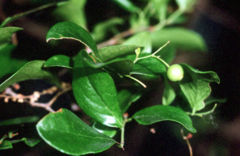Vaccinium arboreum
| subsp. var. | ||||||||||||||||||||||||||||||||||||||||||||||||||||||||
|---|---|---|---|---|---|---|---|---|---|---|---|---|---|---|---|---|---|---|---|---|---|---|---|---|---|---|---|---|---|---|---|---|---|---|---|---|---|---|---|---|---|---|---|---|---|---|---|---|---|---|---|---|---|---|---|---|

|
|
| ||||||||||||||||||||||||||||||||||||||||||||||||||||||
| ||||||||||||||||||||||||||||||||||||||||||||||||||||||||
| Standard Cyclopedia of Horticulture |
|---|
|
Vaccinium arboreum, Marsh. Farkleberry. Sparkle-Berry. Spreading shrub or small tree, 6-25 ft. high, with glabrous or somewhat pubescent branchlets: lvs. 1-2 in. long, evergreen in the S., somewhat coriaceous, smooth and shining above, paler and sometimes pubescent beneath, obovate to oval, acute or obtuse, entire or obscurely denticulate: fls. profuse, axillary, and leafy-racemose, pendulous, articulated with the slender pedicel; corolla open-campanulate, 5-lobed, white; stamens included: berry small, globose, black, rather astringent, inedible. Sandy soil along river banks, Fla. and Texas to N. C. and Ill. L.B.C. 19:1885. B.M. 1607 (as V. diffusum). B.B. 2:580.—"It forms an irregular shrub too diffuse and straggling to be of use except in masses, for which purpose it is useful at the South."
|
Vaccinium arboreum {{{latin_name}}}
|
Sparkleberry, Farkleberry
| ||||||||||||||||||||||||||||||||||||||||
|---|---|---|---|---|---|---|---|---|---|---|---|---|---|---|---|---|---|---|---|---|---|---|---|---|---|---|---|---|---|---|---|---|---|---|---|---|---|---|---|---|---|

|
|
| |||||||||||||||||||||||||||||||||||||||
| |||||||||||||||||||||||||||||||||||||||||
- Do you have a description of this genus or plant? Edit this section!
| Standard Cyclopedia of Horticulture |
|---|
|
Farkleberry. Sparkle-Berry. Spreading shrub or small tree, 6-25 ft. high, with glabrous or somewhat pubescent branchlets: Ivs. 1-2 in. long, evergreen in the S., somewhat coriaceous, smooth and shining above, paler and sometimes pubescent beneath, obovate to oval, acute or obtuse, entire or obscurely denticulate: fls. profuse, axillary, and leafy-racemose, pendulous, articulated with the slender pedicel; corolla open-campanulate, 5-lobed, white; stamens included: berry small, globose, black, rather astringent, inedible. Sandy soil along river banks, Fla. and Texas to N. C. and Ill. L.B.C. 19:1885. B.M. 1607 (as V. diffusum). B.B. 2:580.—"It forms an irregular shrub too diffuse and straggling to be of use except in masses, for which purpose it is useful at the South." The above text is from the Standard Cyclopedia of Horticulture. It may be out of date, but still contains valuable and interesting information which can be incorporated into the remainder of the article. Click on "Collapse" in the header to hide this text. |
- More information about this species can be found on the genus page.
Cultivation
| calendar? | ||
|---|---|---|
| January: | ||
| February: | ||
| March: | ||
| April: | ||
| May: | ||
| June: | ||
| July: | ||
| August: | ||
| September: | ||
| October: | ||
| November: | ||
| December: | ||
| Notes: | ||
- Do you have cultivation info on this plant? Edit this section!
Propagation
- Do you have propagation info on this plant? Edit this section!
Pests and diseases
- Do you have pest and disease info on this plant? Edit this section!
Species
Gallery
If you have a photo of this plant, please upload it! Plus, there may be other photos available for you to add.
-
photo 1
-
photo 2
-
photo 3
References
External links
- w:Vaccinium arboreum. Some of the material on this page may be from Wikipedia, under the Creative Commons license.
- Vaccinium arboreum QR Code (Size 50, 100, 200, 500)
